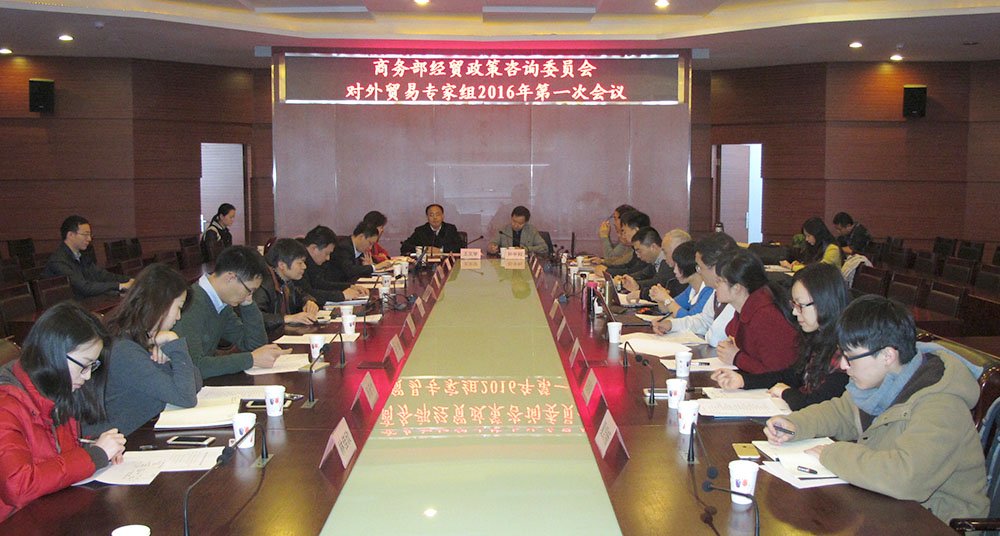Experts Meet at CUEB for Discussions on New Trends in Foreign Trade

On March 10th, a foreign trade seminar co-organized by CUEB School of Economics and Ministry of Commerce Policy Research Department kicked off at CUEB. In the context of mounting challenges in China’s foreign trade, the seminar, on the theme of 2016 government work focuses and decision-making references, explored relevant policies to jump-start foreign trade, including exchange rate and tax rebate system adjustment, trade facilitation, processing trade transformation, Belt and Road Initiative, international capacity cooperation, etc.
At the seminar, experts delivered speeches shedding light on the theme. Zhou Shijian, executive director of China Association of International Trade (CAIT), gave a speech on how to rally China’s foreign trade. He said foreign trade enterprises should be supported by policies in RMB exchange rate and duty drawback, which could help to alleviate their burdens.
Niu Li, director of the Macro Projection Department at the State Information Center, analyzed the big picture of China’s foreign trade and pointed out that traditional investment-driven and export-oriented trade should transform to medium-high end value chain trade.
Chen Daofu, policy research chief at the Financial Research Institute, State Council's Development Research Center, analyzed from a micro-perspective the difficulties and bottlenecks in the development of China’s foreign trade enterprises, and offered suggestions on processing trade transformation and upgrade.
Li Gang, vice president of Chinese Academy of International Trade and Economic Cooperation (CAITEC), Ministry of Commerce, said that during the 13th Five Year Plan (from 2016 to 2020), China’s foreign trade work should focus on the tandem of goods and service trades. He also pointed out that China’s service trade still has huge potential compared with the US and other developed countries.
The speech of Hong Junjie, dean of School of International Trade and Economics, University of International Business and Economics (UIBE), touched upon the stability of exchange rate, competitiveness development of foreign trade enterprises, the long-term impacts of TPP on China, Belt and Road Initiative, cross-border e-commerce development and so on. He also suggested carrying out joint research projects to facilitate the work of the panel as a think tank.
Professor Fang Ming from Anhui University of Finance and Economics regarded technological innovation as the key for China’s processing trade transformation and upgrade. He said that we can effectively raise the competitiveness of domestic enterprises by boosting strategic emerging industries, and particularly by developing those enterprises’ independent innovation capacity and providing them stronger support.
Professor Bi Yujiang from Shanghai Lixin University of Commerce shared his take on foreign trade development from the perspective of overseas market demand. He said that rebound of foreign trade requires thorough implementation of policies to optimize commodity mix and regional structure. He also mentioned that to boost foreign trade, supporting policies should closely follow the upcoming new drivers in global economy.
Professor Zhou Maorong from Wuhan University proposed that to develop China from a large trading country into a strong one, we should strive to increase our weight in global value chain and be more engaged in the making of international trade and economic rules. It is particular important to overcome numerous obstacles while reform is at the most difficult stage, she emphasized.
Associate Professor Du Li, from Economics and Management School of Wuhan University, aired her opinions on Belt and Road Initiative and international capacity cooperation. She pointed out that we should be active yet prudent in Belt and Road development and cross-border capacity cooperation with further researches in risk prevention and domestic industry hollowing.
He Hui from China Federation of Logistics & Purchasing gave a speech on structural reform, deregulation, Belt and Road development, integration of domestic and international markets as well as import promotion. He also spoke of his expectations on China’s foreign trade dynamics according to PMI and other price indexes.
Tu Xinquan, dean of China Institute for WTO Studies, UIEB, said that to press ahead with opening up to the outside world through FTA will put foreign trade back on the fast-track.
Zhang Bin, research fellow from Institute of World Economics and Politics, CASS, proposed that compared with other major economies, China’s foreign trade growth prospect is not as bleak as expected. Besides, he suggested authorities improve the transparency of quarterly data, research quality and the accuracy of predication.
Associate Professor Wang Mingrong of CUEB School of Economics shared her latest research outcome on China’s import promotion and improvement. She said the diversity of import commodities can be enhanced by bringing down import tariff of intermediate products and raising exchange rate.
